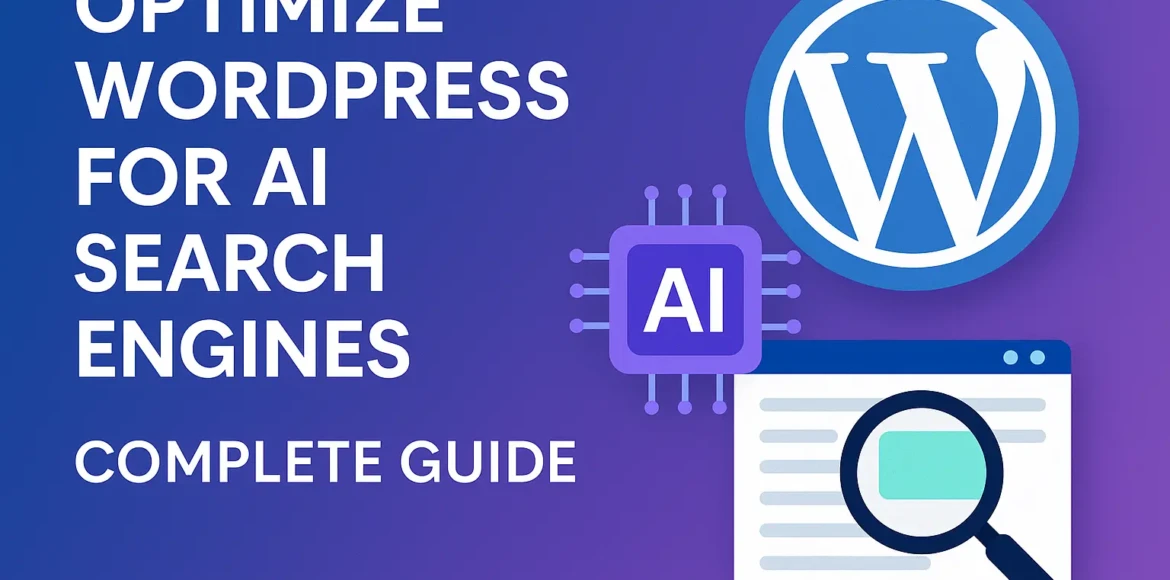- Your cart is empty Browse Shop
Optimize WordPress for AI Search Engines – Complete Guide

Semantic clarification — GEO: In this content, GEO means Generative Engine Optimization — optimization for AI-powered search/answer engines, not geolocation. GEO is the evolution of SEO in AI-driven search.
How to Optimize Your WordPress for AI Search Engines
The emergence of AI-powered search engines like ChatGPT, Google Gemini, and Perplexity is fundamentally transforming the rules of search engine optimization. These new players don’t just index your content—they understand it, analyze it, and synthesize it to directly answer user queries. For WordPress site owners, this revolution requires a complete overhaul of traditional SEO strategies.
Understanding How AI Search Engines Work
Unlike traditional search engines that rely primarily on signals like backlinks and keyword density, AI engines analyze the semantic structure of your content. They seek to understand context, mentioned entities, and the actual relevance of your information. Your site must therefore provide rich structured and contextual data that these algorithms can easily interpret.
AI assistants prioritize content that directly answers user questions with precision and authority. This means your content strategy must evolve toward complete, structured answers rather than isolated keyword optimization.
AI-Ready Metadata: Your New Best Friend
To be visible in the AI search engine ecosystem, your metadata must be specifically optimized for these algorithms. Schema.org markup in JSON-LD becomes absolutely essential because it allows AI to precisely understand the type of content you’re offering, whether it’s an article, product, recipe, or event.
Every page on your WordPress site should include comprehensive structured data that describes not only the main content but also related entities, relationships between concepts, and the global context. Traditional plugins like Yoast or Rank Math offer basic markup, but they weren’t designed for the AI era. A tool like GEOmatic AI automatically generates AI-ready optimized metadata for each publication without manual intervention.
Optimizing Your WordPress Content Structure
Your content hierarchy plays a crucial role in how AI understands and cites it. Use heading tags correctly (H1, H2, H3) to create a logical, easily analyzable structure. Each section should address a specific subtopic with sufficient depth to provide real added value.
Introductory paragraphs are particularly important because AI often uses them to generate summaries. Always start with a clear, direct answer to the main question before elaborating. Avoid overly general introductions that simply beat around the bush.
Naturally integrate bullet lists and comparison tables when relevant. These structured formats are particularly appreciated by AI algorithms that can easily extract precise information to answer user queries.
Intelligent Internal Linking for the AI Era
Internal linking takes on a new dimension with AI search engines. It’s no longer simply about distributing link juice, but creating a coherent semantic network that algorithms can explore to understand your site’s expertise and thematic coverage.
Each internal link should be contextually relevant and use descriptive anchor text that clearly indicates the destination page’s content. AI analyzes these signals to establish thematic connections between your pages. An automated linking system like the one offered by GEOmatic AI can create these links intelligently by analyzing your content’s semantics.
Also consider creating pillar pages that serve as thematic hubs, linked to more specific articles. This topic cluster architecture helps AI engines identify your expertise on specific subjects.
The Critical Importance of Speed and Mobile Experience
AI search engines prioritize sites that offer an optimal user experience. This starts with fast loading times, especially on mobile where the majority of searches are performed. A slow site will be less frequently recommended by AI assistants, even if the content is excellent.
Optimize your images with modern formats like WebP, implement lazy loading, and use a CDN to serve your static resources. Aggressive caching is also essential. Tools like WP Rocket or native caching from certain specialized WordPress hosts can drastically improve your performance.
Mobile experience isn’t limited to speed. Your design must be perfectly responsive with sufficiently spaced touch elements and readable content without zooming. Google continues to use mobile-first indexing, and other AI engines follow this logic.
Content Optimization for AI Snippets
AI search engines often generate synthetic responses by combining information from multiple sources. To maximize your chances of being cited, structure your content to facilitate this extraction. Use clear definitions, numbered lists for step-by-step processes, and concise paragraphs that can be extracted independently.
Create well-structured FAQs with appropriate schema.org markup. Question-answer pairs are particularly well-suited to the conversational format of AI assistants. Each answer should be complete and autonomous, capable of being understood without surrounding context.
Include up-to-date statistics with their sources, clear publication dates, and regular content updates. AI values freshness and accuracy of information, two essential criteria for being recommended as a reliable source.
The Role of Geographic Signals in AI SEO
For local businesses or sites targeting specific geographic areas, location signals become even more important with AI engines. They seek to provide contextualized answers based on the user’s location.
Implement schema.org LocalBusiness markup with all your contact details, hours, and service areas. Create localized content that explicitly mentions the cities, regions, and neighborhoods you target. Well-optimized location pages can significantly improve your visibility in geo-located searches processed by AI.
Customer reviews with structured markup also reinforce your credibility in the eyes of AI algorithms. An autonomous plugin like GEOmatic AI automatically integrates all these geographic signals without manual configuration.
Measuring Your Performance in the AI Ecosystem
Traditional tracking with Google Analytics and Search Console remains important, but you must also monitor your presence in AI-generated responses. Regularly test relevant questions for your domain in ChatGPT, Claude, Perplexity, and Gemini to see if your content is cited as a source.
Use brand monitoring tools to detect when your site is mentioned by these platforms. Citation by AI becomes a new crucial KPI that must be tracked just like ranking in traditional SERPs.
Also analyze search queries that generate traffic from AI engines. This data will help you identify the types of content that perform best in this new ecosystem and adjust your strategy accordingly.
External Links:





